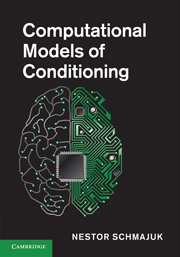Book contents
- Frontmatter
- Contents
- List of contributors
- Introduction
- 1 Evolution of attention in learning
- 2 The arguments of associations
- 3 The hybrid modeling approach to conditioning
- 4 Within-compound associations: models and data
- 5 Associative modulation of US processing: implications for understanding of habituation
- 6 Attention, associations, and configurations in conditioning
- 7 Computer simulation of the cerebellum
- 8 The operant/respondent distinction: a computational neural-network analysis
- Index
- References
Introduction
Published online by Cambridge University Press: 10 January 2011
- Frontmatter
- Contents
- List of contributors
- Introduction
- 1 Evolution of attention in learning
- 2 The arguments of associations
- 3 The hybrid modeling approach to conditioning
- 4 Within-compound associations: models and data
- 5 Associative modulation of US processing: implications for understanding of habituation
- 6 Attention, associations, and configurations in conditioning
- 7 Computer simulation of the cerebellum
- 8 The operant/respondent distinction: a computational neural-network analysis
- Index
- References
Summary
This book contains the presentations given during the Duke Symposium on Computational Models of Conditioning, which took place between May 15th and May 17th of 2009 at the Duke Campus in Durham, N.C. The meeting was sponsored by the Duke Department of Psychology and Neuroscience, the Duke Office of the Vice Provost for International Affairs, and the Duke Arts and Sciences Research Council. All the participants and I are indebted for their generous support.
The meeting was organized with the assistance of my friend and former Ph.D. advisor Professor John Moore (University of Massachusetts at Amherst). I am particularly thankful to John for helping me in finding a group of participants who contributed both well-established and novel theories of classical conditioning. I am also grateful to Munir Gunes Kutlu for his help in running many aspects of the meeting.
The models
John Kruschke and Rick Hullinger (Indiana University, USA) prepared the chapter on “The evolution of learned attention.” In this chapter, the authors use simulated evolution, with adaptive fitness measured as overall accuracy during a lifetime of learning, and show that evolution converges to architectures that incorporate attentional learning. They also describe the specific training environments that encourage this evolutionary trajectory, and how we assess attentional learning in the evolved learners. Interestingly, the resulting attentional mechanism is similar to that proposed by Mackintosh (1975).
- Type
- Chapter
- Information
- Computational Models of Conditioning , pp. 1 - 9Publisher: Cambridge University PressPrint publication year: 2010

